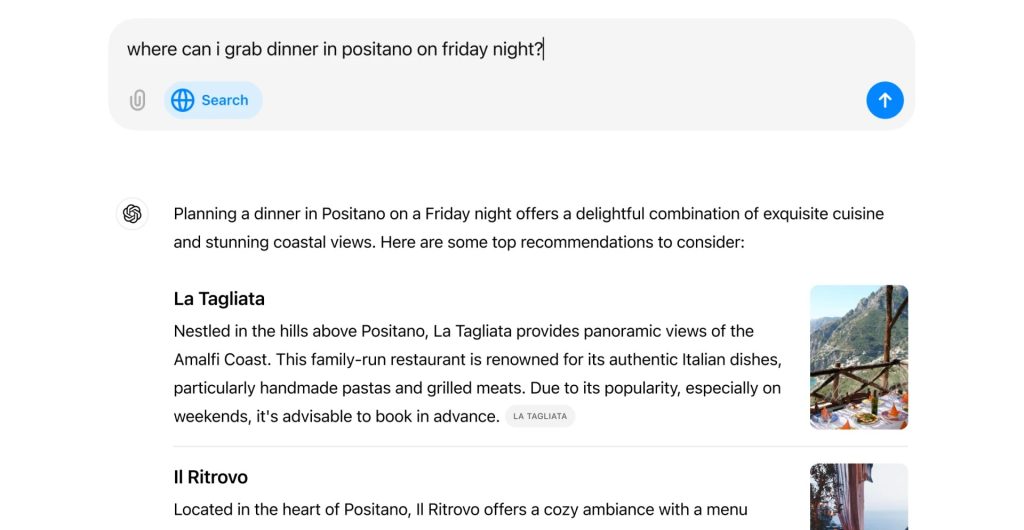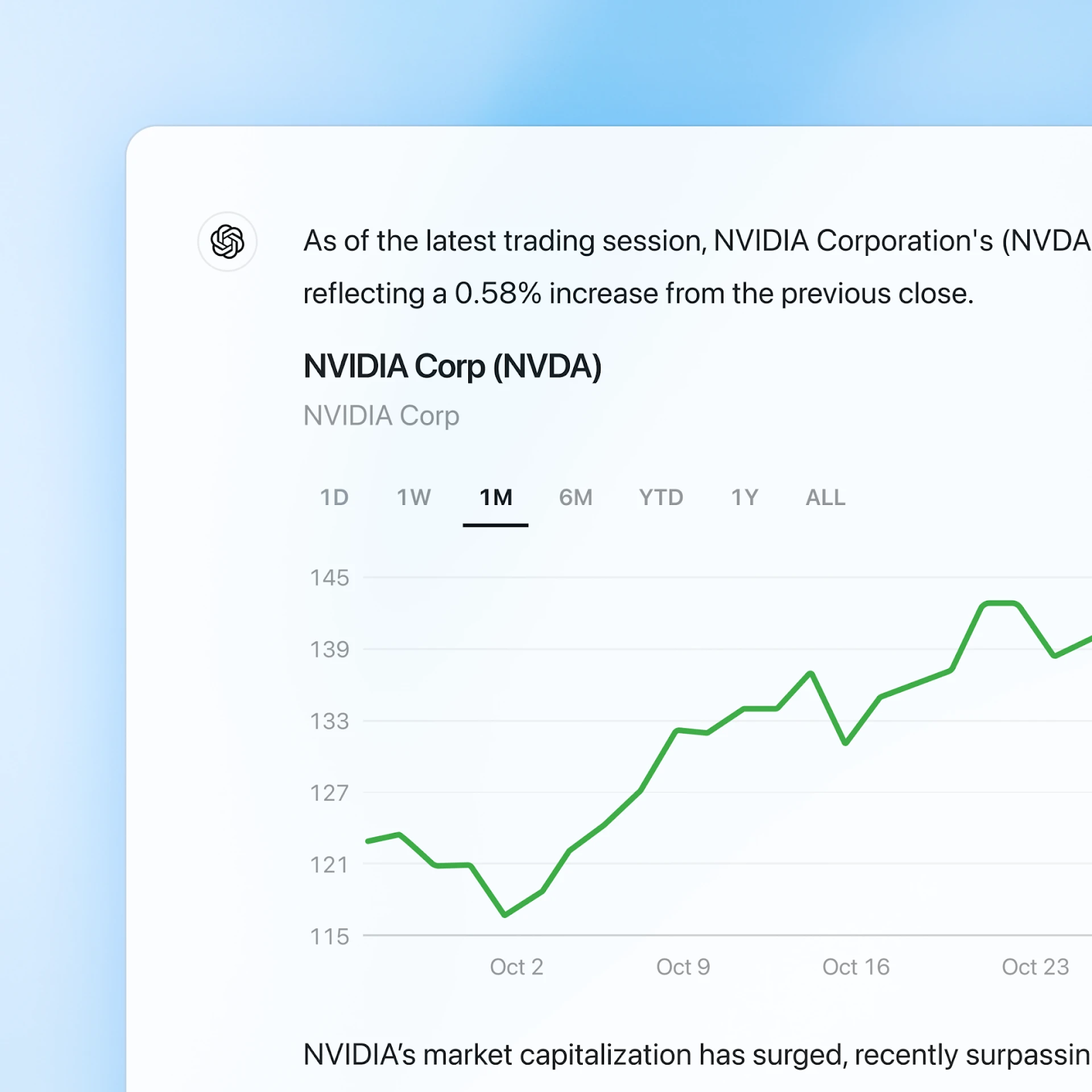When it comes to tasks which are as simple as a name search or even complex web scraping, Google has always been up top. Many search engines have tried to compete, but none had the innovative edge for it, until OpenAI’s SearchGPT.
OpenAI recently launched SearchGPT, a search engine backed by OpenAI’s technology, which brings a fresh perspective to searching on the internet. It has reengineered the qualities of a search engine, but can it compete with Google? Let’s find out.
SearchGPT : How does it work?
Unlike the usual listing of weblinks, SearchGPT returns conversation style answers that it finds from the web.
One can ask follow up questions to dig deeper into their searches, and GPT will take into consideration the entire context and get a better answer for you. Other features include :
Real-time Data : Things like match scores, weather details, stock market graphs can be accessed in real-time, which gives fresh information on your fingertips.
Power of GPT 4.o : The search model is a fine-tuned version of GPT-4o, trained specifically for the task of retrieving efficient links for one’s search, and the force behind dialogue style answers.
Partnerships : To provide relevant responses to your questions, ChatGPT searches based on your prompts and may share disassociated search queries with third-party search providers such as Bing. This aims to enhance your search.

The search model is a fine-tuned version of GPT-4o, post-trained using novel synthetic data generation techniques, including distilling outputs from OpenAI o1-preview. ChatGPT search leverages third-party search providers, as well as content provided directly by their partners, to provide the information users are looking for.
The web search button prompts searching the internet for recommendations. This returns a list of restaurants, based on their ranking and reviews from across websites.

History of SearchGPT
On 25th July, 2024, the prototype of SearchGPT came to be, and OpenAI publicly released the waitlist to use the prototype. At this stage, the company wanted to receive feedback, and also to see the way it responded to other search results, from real users.
OpenAI presented it as getting answers on the web quicker and faster, without a lot of effort or requiring multiple attempts to get relevant results.
“You’ll be able to ask follow-up questions, like you would in a conversation with a person, with the shared context building with each query” is mentioned as their star feature.
They are committed to fostering a thriving ecosystem of publishers and creators. Their goal is to assist users in discovering publisher sites and experiences while providing more choice in search. They are utilizing AI to enhance this experience by showcasing high-quality content in a conversational interface and offering multiple opportunities for user engagement.
Big names are in the list of their partnerships, such as Axel Springer, Condé Nast, Dotdash Meredith, Financial Times, and much more.
The CEO of The Atlantic, Nicholas Thompson, quotes “AI search is going to become one of the key ways that people navigate the internet, and it’s crucial, in these early days, that the technology is built in a way that values, respects, and protects journalism and publishers. We look forward to partnering with OpenAI in the process, and creating a new way for readers to discover The Atlantic.”
Can I use SearchGPT?
Currently, SearchGPT is limited for use by ChatGPT Plus and Team users. You can directly do so from chatgpt.com. Furthermore, you can install a Chrome extension that will give SearchGPT direct access to the browser’s URL bar, which makes the process of searching even more seamless.
For others, ChatGPT is focusing on bringing SearchGPT in the market soon enough, so it’s good to keep an eye out for that!
Can it compete with Google?
Google has been the search engine giant since the start, having pressed down all kinds of competitions, from Bing, Yahoo, to other smaller innovations.
The thing that is different with SearchGPT, is the style of searching, and its response structure. This could be a breath of fresh air for people who want to dig the Internet, but for their own unique use cases.
Here is a comparison of the two :
| Features | SearchGPT | |
|---|---|---|
| Response Style | A natural, conversational response that feels unique to each user. | A list of relevant websites to the search, ranked according to SEO metrics |
| Launched | 2024 | 1998 |
| Ads | Currently it is Ad-free | Contains Ads that generate a revenue of over 150 million |
| Real-time Updates | From its partnerships, it has access to real-time, up to date data | Since it comes from websites, it can contain delayed information |
| Text Organization | Presents visual effects and dialogue-style summaries, rephrasing it for better understanding | Summarizes content from websites and highlights the most relevant piece of text, that matches the search |
| Database | It has a relatively smaller database that is put together via partnerships. | It has a wide variety of websites, and displays the most trusted sources |
| Scope of Search | Currently, it has the database for Weather, Stocks, Sports, News and Maps only. | It can be used to search about almost any niche, due to its rich database of websites |
| Reliability | Since the information comes from Partnerships, there is a chance that the results are biased. This hampers the searching experience | It contains information from across websites and thus has unbiased results. |
Google has been a household name for web search, and will continue to be so, until SearchGPT can step strong footing in the market. With its niche features and small scale development, it is too early to assume that it can compete with the tech giant.
In the future, though, SearchGPT can surprise the world with world-class knowledge on one’s fingertips, creating a platform that maintains personalization, just as it has with ChatGPT.
Needless to say, Google is trying to incorporate its own AI model, Gemini, into the search engine landscape. Gemini helps the user with searching, by generating responses based on its web scraping results. One can ask follow up questions to Gemini as well, coming closer to the innovation that SearchGPT is.
Is OpenAI’s SearchGPT better than Google? That’s an individual decision. For people who don’t like change, Google will always be the safer, suitable option. For the ones that want to experience a more conversational way of searching, SearchGPT brings that option to the table.

Future Scope of SearchGPT
The current features of SearchGPT are not enough to become the next best search engine just yet. Even though it’s a fairly new model, it is limited in its resources that generate the responses. Adding to this, it only has expertise in a few fields, and plans to expand their base.
The future of SearchGPT sees better reach from more third-party involvements, as well as a deeply nourished dataset for perfecting search responses. OpenAI plans to do this from feedback and continued training of the model. Bringing into the market, its o1 series, it plans on expanding that into all of its younger products.
Being Ad free, it attracts audiences to use SearchGPT, as well as reinforce the practice of using ChatGPT, but for web searching.
Conclusion
Going over all these points, it is clear that Google has a stronger footing when it comes to being an efficient search engine. With its vast data pool and simple features, it stands at the top. While talking about SearchGPT, we came across the beginning of a revolutionary way of searching. Something that is curated and personalised for each individual, and can have quicker searching efficiencies in the longer run.
Personalization or Generalization? We will experience that soon enough, when SearchGPT rolls out into the AI market.
Have you heard about another one of OpenAI’s innovations, InstructGPT? Click here to find out!